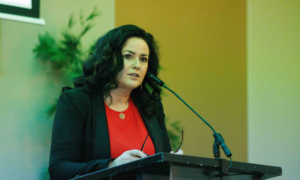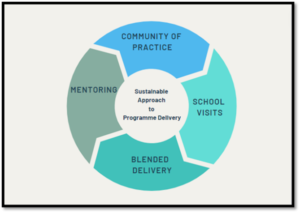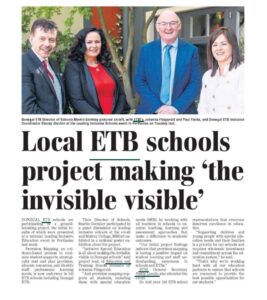
Since 2016, the Education and Training Board (ETB) sector has partnered with Mary Immaculate College in Limerick to support research-informed development of schoolwide, systematic, and collaborative approaches to inclusive and special education and build school, and sector-wide inclusive policy and practice. This is known as provision mapping. But what does this mean and what does it involve? In this blog, Dr Johanna Fitzgerald, National Inclusion, Special Education and Research Coordinator with Education and Training Boards Ireland (ETBI) tells us more about it.
What is Provision Mapping?
Provision mapping is an entire system of support and professional learning and development offered to ETB post-primary schools to develop data-informed and strengths-based approaches to leading inclusive special education. It integrates existing policy frameworks of School Self-Evaluation and the National Educational Psychological Service (NEPS) Continuum of Support to inform school improvement planning and Delivering Equality of Opportunity In Schools (DEIS) planning. It is underpinned by research, policy and theory and is currently underway across 140 post-primary schools in sixteen ETBs, including Donegal. Provision mapping provides:
- A system that builds national, regional, and local leadership capacity for inclusive school improvement.
- An accountability tool to deploy Special Education Teaching (SET) allocations and evaluate their impact.
- A transformative professional learning programme.
How does provision mapping support schools?
Provision mapping supports all students, including those with special education needs and disabilities, by working with all teachers in schools to examine teaching, learning and assessment approaches that make a difference to students’ outcomes. The strands to support implementation of provision mapping are summarised as:
- Online Learning. Two full-day professional learning events for new schools (one in-person event and one online).
- Community of practice. Structured communities of practice are scheduled throughout the year with targeted practical workshops for teachers involved in leading provision mapping.
- Mentoring. School visits, drop-in clinics, email, and telephone support are available to all participating schools.

To support operational implementation of provision mapping, each of the sixteen ETBs appointed a dedicated Inclusion Coordinator one day per week to work with Dr Johanna Fitzgerald, the ETBI National Inclusion, Special Education and Research Coordinator.
Why is provision mapping important?
Schools are including increasing numbers of students with special educational needs and disabilities. While diversity is to be embraced, school leaders, teachers and Special Needs Assistants (SNAs) require sustained and context-based support and access to professional learning and development to respond to students’ needs. Special Education Teachers and Special Education Needs Coordinators cannot be fully responsible for meeting these students’ needs. It requires wholesale investment from the entire school community to ensure that students are engaging with learning. School improvement is linked to a school’s collective capacity to respond to change, and provision mapping builds a flexible and responsive infrastructure within and across schools.
Is provision mapping having a positive impact in schools?
We recently held a showcase event in Portlaoise, to celebrate and spotlight the innovative work of schools and ETBs involved in provision mapping. The event was a spectacular success and provided an opportunity to share our innovative work with all our partners in education.
schools and ETBs involved in provision mapping. The event was a spectacular success and provided an opportunity to share our innovative work with all our partners in education.
Findings from three research evaluations since 2016 indicate that provision mapping is having a positive impact on student learning and staff understanding, awareness and skill development. Research from a pilot of provision mapping undertaken in Limerick and Clare ETB was evaluated and published (Fitzgerald, Lynch, Martin and Cullen 2021). The publication can be accessed here. A nationwide pilot was undertaken between 2020-2023 with 33 schools across fourteen ETBs. An Interim Evaluation of Provision Mapping was completed in June 2022 (Fitzgerald 2022), and a final evaluation in June 2023. The final report is currently in press and will be published in summer 2024. Summary findings from all three datasets indicate that provision mapping is:
- Building coherence and integration of school policies and practice and is leading to evidence- informed inclusive school improvement.
- Embedding collaborative and networked leadership within and across schools for collective decision-making in inclusive special education.
- Providing situated and evidence-informed learning for all.
What is happening with provision mapping in 2024-2025 academic year?
The initial implementation of provision mapping is spread across two academic years, and new schools are invited to join annually. We hope to have 200, or more, of the 250 ETB post-primary schools involved in September 2024. In the past year, we have worked closely with the National Council for Special Education (NCSE) to consider how provision mapping can support cross sectoral inclusive school improvement, and we are hoping to make an impact on policy development in this area. What we are doing is working, and several of our provision mapping schools have had inspections, with Inspectorate Reports referencing the positive impact of provision mapping. Greater partnership with the Department of Education, NCSE and Inspectorate is envisaged as we continue to develop and embed provision mapping across our schools.
References
Fitzgerald, J., Lynch, J., Martin, A., Cullen, B. (2021). ‘Leading Inclusive Learning, Teaching and Assessment in Post-Primary Schools in Ireland: Does Provision Mapping Support an Integrated, School-Wide and Systematic Approach to Inclusive Special Education?’ Education Sciences. 11(4):168. https://doi.org/10.3390/educsci11040168
